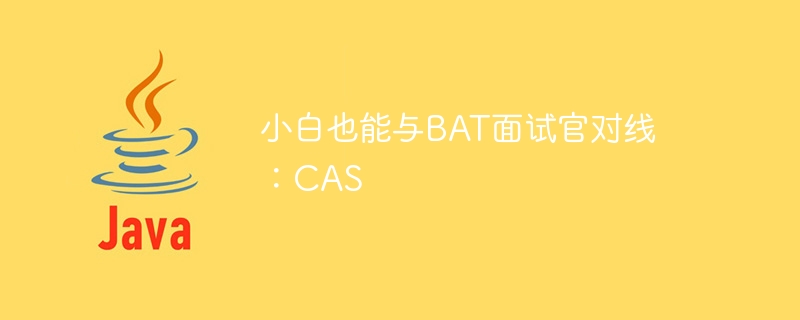High-frequency Java questions and answers for interviews
With the widespread application of the Java language, it is very common for Java programmers to encounter various Java problems during interviews. Therefore, it is very important to understand common Java questions and answers. This article summarizes some frequently asked Java interview questions and the best answers. I hope this knowledge can help you stand out in the interview.
- What is the difference between Java and JavaScript?
This is a common question. It should be noted that Java and JavaScript are two completely different languages. Java is an object-oriented programming language primarily used for building enterprise-level applications. JavaScript is a web-based scripting language that can be used on the client or server side.
The best answer is: Java and JavaScript are two different programming languages. Java is mainly used for building enterprise-level applications, while JavaScript is mainly used for web front-end development.
- How to create a singleton pattern?
The singleton pattern is a very common pattern that ensures that only one object instance exists. There are many ways to create a singleton pattern, including hungry singletons, lazy singletons, thread-safe singletons, etc.
The best answer is: Common methods of creating singleton patterns include hungry singletons, lazy singletons, and thread-safe singletons. Each method has its advantages and disadvantages, and you need to choose the appropriate method according to the situation.
- What are the functions of hashCode() and equals() methods?
hashCode() and equals() are two important methods that are used to compare objects for equality in Java.
ThehashCode() method returns the hash code of the object, which is usually used to find the object in the hash table. The equals() method is used to compare whether objects are equal. If the objects are equal, it returns true, otherwise it returns false.
The best answer is: hashCode() and equals() methods are two methods in the Java Object class, used to compare objects for equality. The hashCode() method returns the hash code of the object, and the equals() method is used to compare whether the objects are equal.
- What is the difference between List and Set?
List and Set are two commonly used container types in Java collections, and they have many differences.
List is an ordered container that can contain repeated elements. Lists are usually used to store data that need to be sorted in a specific order.
Set is an unordered container and cannot contain duplicate elements. Sets are usually used to store data that need to be sorted according to uniqueness.
The best answer is: List is an ordered container that can contain repeated elements. Lists are usually used to store data that need to be sorted in a specific order. Set is an unordered container and cannot contain duplicate elements. Sets are usually used to store data that need to be sorted according to uniqueness.
- What are the exceptions in the program? How are they processed?
Exception is a special event that has the ability to disrupt the normal execution of a program. In Java, when an exception occurs in a program, an exception object is usually thrown. This exception object encapsulates the type and cause of the exception. Programs can use try-catch statements to catch and handle exceptions.
The best answer is: An exception is a special event that disrupts the normal execution flow of the program. When an exception occurs in a program, an exception object is usually thrown. Programs can use try-catch statements to catch and handle exceptions. Or throw the exception up and handle it where it's called.
- What is polymorphism? How to implement polymorphism in Java?
Polymorphism means that the same object will show different behaviors in different situations. In Java, polymorphism is achieved through method overloading and method overriding.
Method overloading refers to defining two or more methods with the same name in the same class, but with different parameter lists. Method overloading makes calling methods more convenient.
Method overriding refers to overriding the methods of the parent class in the subclass. Subclasses can add new features to methods or modify the behavior of parent class methods.
The best answer is: Polymorphism means that the same object will show different behaviors in different situations. In Java, polymorphism is achieved through method overloading and method overriding. Method overloading refers to defining two or more methods with the same name in the same class, but different parameter lists. Method overriding refers to rewriting the methods of the parent class in the subclass, making it more convenient to call the method.
Summary
Java is a very powerful programming language. Mastering Java skills can make you more competitive in the workplace. This article gives some common Java questions and answers, hoping to help you succeed in the interview. Of course, these questions are only a small part of the Java knowledge system. If you want to achieve higher achievements in the field of Java, it is recommended to continue to learn and practice Java programming skills.
The above is the detailed content of Frequent Java questions and answers for interviews. For more information, please follow other related articles on the PHP Chinese website!
 面试官:Spring Aop 常见注解和执行顺序Aug 15, 2023 pm 04:32 PM
面试官:Spring Aop 常见注解和执行顺序Aug 15, 2023 pm 04:32 PM你肯定知道 Spring , 那说说 Aop 的去全部通知顺序, Spring Boot 或者 Spring Boot 2 对 aop 的执行顺序影响?说说你在 AOP 中遇到的那些坑?
 某团面试:如果线上遇到了OOM,你该如何排查?如何解决?哪些方案?Aug 23, 2023 pm 02:34 PM
某团面试:如果线上遇到了OOM,你该如何排查?如何解决?哪些方案?Aug 23, 2023 pm 02:34 PMOOM 意味着程序存在着漏洞,可能是代码或者 JVM 参数配置引起的。这篇文章和读者聊聊,Java 进程触发了 OOM 后如何排查。
 蛋仔派对揪出捣蛋鬼答题答案Feb 22, 2024 pm 01:10 PM
蛋仔派对揪出捣蛋鬼答题答案Feb 22, 2024 pm 01:10 PM蛋仔派对最近非常火热的揪出捣蛋鬼答题,到底20道题答案是什么,有很多玩家害怕打错,所以就来搜索,其实这些题目都是很基础,答案已经总结出来了,一起来看看这篇蛋仔派对揪出捣蛋鬼全20题答案汇总,肯定能够给你带来帮助。蛋仔派对攻略大全蛋仔派对揪出捣蛋鬼答题答案1、作为一名心机蛋,以下哪个是你的技能效果?答案:可以让被击倒的蛋仔隐形2、一局游戏失败后,以下哪种行为是不对的?答案:指责导致失败的蛋仔。3、以下哪个关于紧急讨论的说法是正确的?答案:在有重要信息时可以发起紧急讨论来告诉大家4、以下哪个蛋在在局
 蚂蚁新村今日答案2.22Feb 22, 2024 pm 01:10 PM
蚂蚁新村今日答案2.22Feb 22, 2024 pm 01:10 PM以下哪个职业专门修复破损的彩妆产品是蚂蚁新村今日问题,蚂蚁新村今日答案是彩妆修复师,一些贵的彩妆还是修复之后再利用更具有性价比,具体内容一起跟随小编看看这篇2024蚂蚁新村今日答案2.22最新,希望能够给你带来帮助。蚂蚁新村今日答案最新蚂蚁新村今日答案2.22问题:以下哪个职业专门修复破损的彩妆产品答案:彩妆修复师解析:彩妆修复师是专门修复破损彩妆产品的手艺人,他们通过研磨、加热、消毒、塑型、分装等各种工序,将已经破损的彩妆产品进行重新修复。
 蚂蚁庄园今日答案2.24Feb 23, 2024 pm 01:13 PM
蚂蚁庄园今日答案2.24Feb 23, 2024 pm 01:13 PM蚂蚁庄园今日答案2.24是什么?今天的问题分别是:为了避免汤圆粘到锅底,应该?“星灿乌云里,珠浮浊水中”是哪种节日美食?有许多小伙伴还不知道问题的答案,那么下面小编就为大家带来了2024最新蚂蚁庄园小鸡2.24今日答案,感兴趣的小伙伴快来一起了解一下吧。蚂蚁庄园今日答案汇总蚂蚁庄园今日答案2.24问题一:为了避免汤圆粘到锅底,应该?正确答案:开水下汤圆蚂蚁庄园2.24问题一答案详情问题二:“星灿乌云里,珠浮浊水中”是哪种节日美食?正确答案:汤圆蚂蚁庄园2.24问题二答案详情蚂蚁庄园每日一题怎么参
 蚂蚁庄园今日答案1.28Feb 24, 2024 pm 01:30 PM
蚂蚁庄园今日答案1.28Feb 24, 2024 pm 01:30 PM蚂蚁庄园今日答案1.28是什么?今天的问题分别是:为什么电灯用久了,周围的墙壁容易被“票黑”?西南民间菜“折耳根”为什么又叫“鱼腥草”?有许多小伙伴还不知道问题的答案,那么下面小编就为大家带来了2023最新蚂蚁庄园小鸡1.28今日答案,感兴趣的小伙伴快来一起了解一下吧。蚂蚁庄园今日答案汇总蚂蚁庄园今日答案1.28问题一:为什么电灯用久了,周围的墙壁容易被“票黑”?正确答案:微粒沉积导致蚂蚁庄园1.28问题一答案详情问题二:西南民间菜“折耳根”为什么又叫“鱼腥草”?正确答案:有鱼腥味蚂蚁庄园1.2
 饿了么笔试题,看似简单,难倒一批人Aug 24, 2023 pm 03:29 PM
饿了么笔试题,看似简单,难倒一批人Aug 24, 2023 pm 03:29 PM在很多公司的笔试题中,千万别小看,都是有坑的,一不小心自己就掉进去了。遇到这种关于循环的笔试题,建议,自己冷静思考,一步一步来。
 小白也能与BAT面试官对线:CASAug 24, 2023 pm 03:09 PM
小白也能与BAT面试官对线:CASAug 24, 2023 pm 03:09 PMJava并发编程系列番外篇C A S(Compare and swap),文章风格依然是图文并茂,通俗易懂,让读者们也能与面试官疯狂对线。


Hot AI Tools

Undresser.AI Undress
AI-powered app for creating realistic nude photos

AI Clothes Remover
Online AI tool for removing clothes from photos.

Undress AI Tool
Undress images for free

Clothoff.io
AI clothes remover

AI Hentai Generator
Generate AI Hentai for free.

Hot Article

Hot Tools

SublimeText3 English version
Recommended: Win version, supports code prompts!

SAP NetWeaver Server Adapter for Eclipse
Integrate Eclipse with SAP NetWeaver application server.

WebStorm Mac version
Useful JavaScript development tools

SublimeText3 Linux new version
SublimeText3 Linux latest version

MinGW - Minimalist GNU for Windows
This project is in the process of being migrated to osdn.net/projects/mingw, you can continue to follow us there. MinGW: A native Windows port of the GNU Compiler Collection (GCC), freely distributable import libraries and header files for building native Windows applications; includes extensions to the MSVC runtime to support C99 functionality. All MinGW software can run on 64-bit Windows platforms.






